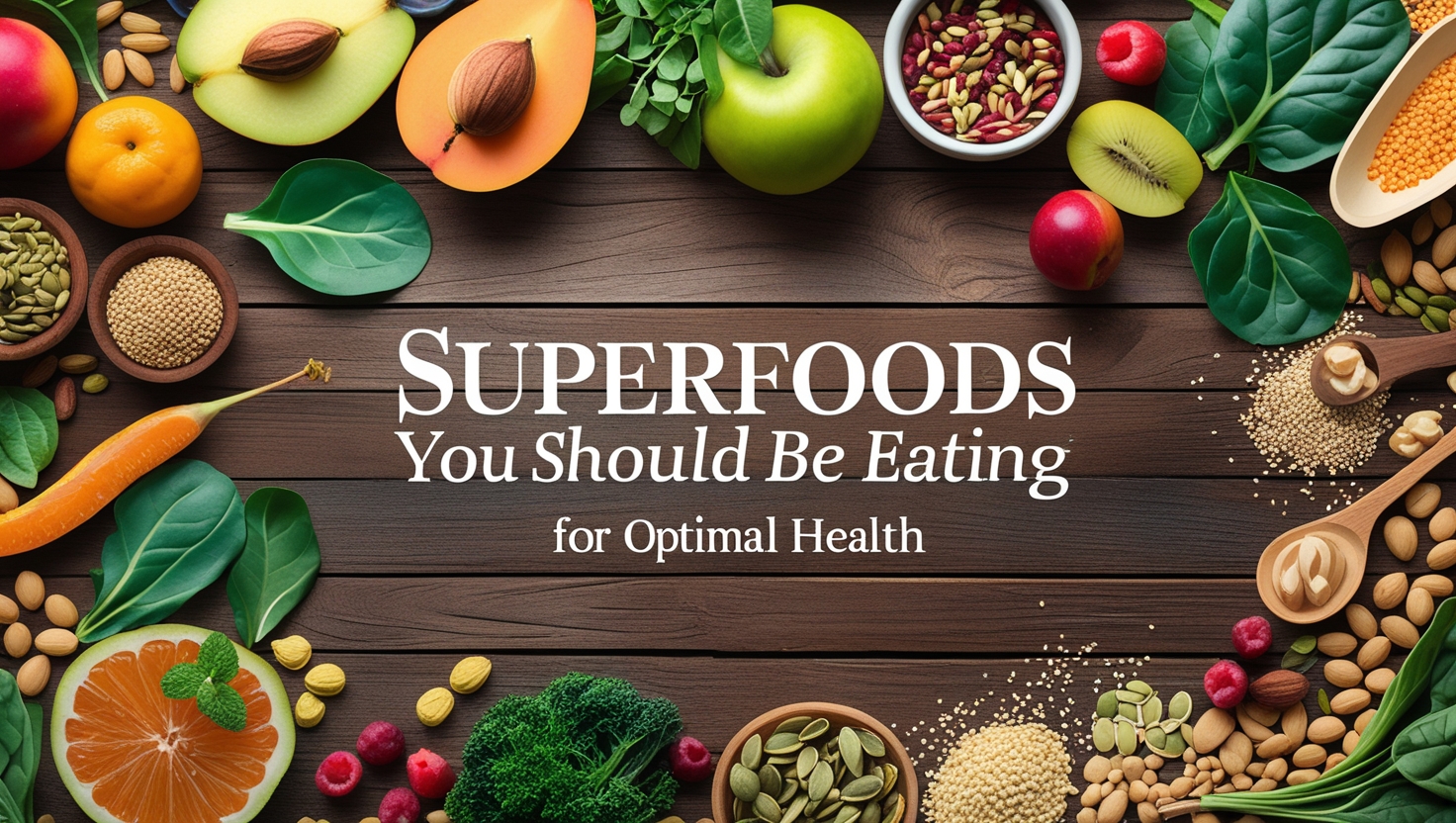In today’s fast-paced world, maintaining optimal health is more crucial than ever. While many of us focus on exercise and stress management, our diet plays a pivotal role in how we feel and function each day. Superfoods—nutrient-dense, naturally occurring foods—are powerful allies in achieving overall wellness. Rich in vitamins, minerals, antioxidants, and other essential nutrients, superfoods help combat inflammation, boost immunity, and support energy levels.
This comprehensive guide will delve into what superfoods are, why they’re essential for optimal health, and which ones you should include in your daily diet. Whether you’re a busy professional, a health enthusiast, or simply looking to improve your diet, the insights provided here will help you make informed decisions for long-term wellness.
Discover Top-Rated Superfood Supplements – Elevate Your Health Today!
What Are Superfoods?
Superfoods are nutrient-rich foods considered to be especially beneficial for health and well-being. They are usually whole, natural foods that provide high levels of essential vitamins, minerals, antioxidants, and phytonutrients.
Characteristics of Superfoods
- High Nutrient Density: They contain more nutrients per calorie than many other foods.
- Natural and Unprocessed: Superfoods are typically whole foods in their natural state.
- Health Benefits: They offer protective properties, including anti-inflammatory, anti-oxidative, and immune-boosting effects.
- Versatility in Diet: Superfoods can be easily incorporated into various recipes and diets.
Examples of Superfoods
Some common examples include blueberries, kale, quinoa, salmon, acai berries, chia seeds, and almonds. Each superfood has its unique blend of nutrients that benefit different aspects of health.
The Science Behind Superfoods
The importance of superfoods lies in their high nutritional value and their impact on chronic disease prevention. Numerous studies have linked superfoods to reduced risks of heart disease, diabetes, and even cancer. For instance:
- Antioxidant Power: Superfoods like blueberries and acai berries are loaded with antioxidants that combat free radicals and reduce oxidative stress.
- Anti-inflammatory Properties: Foods such as turmeric, salmon, and leafy greens help combat chronic inflammation—a key factor in many chronic diseases.
- Improved Metabolic Health: High-fiber foods like quinoa and chia seeds support healthy digestion and stable blood sugar levels.
Top Superfoods for Optimal Health
Below, we explore some of the most powerful superfoods and how they contribute to overall health.
1. Blueberries
Nutritional Benefits:
Blueberries are rich in antioxidants, fiber, and vitamin C. They have been shown to improve brain function and reduce the risk of heart disease.
Health Impact:
Regular consumption of blueberries can improve memory, reduce inflammation, and lower blood pressure.
2. Kale
Nutritional Benefits:
Kale is packed with vitamins A, C, and K, as well as calcium, iron, and fiber. Its high nutrient density makes it one of the best vegetables for overall health.
Health Impact:
Consuming kale helps detoxify the body, support bone health, and fight inflammation.
3. Quinoa
Nutritional Benefits:
Quinoa is a complete protein, meaning it contains all nine essential amino acids. It is also gluten-free and high in fiber, magnesium, and antioxidants.
Health Impact:
Quinoa aids in muscle repair, supports a healthy digestive system, and keeps you fuller longer—making it an excellent choice for weight management.
4. Salmon
Nutritional Benefits:
Salmon is an excellent source of omega-3 fatty acids, high-quality protein, and vitamin D. It contributes to cardiovascular health and reduces inflammation.
Health Impact:
Regular consumption of salmon can improve heart health, reduce the risk of chronic diseases, and enhance brain function.
5. Chia Seeds
Nutritional Benefits:
Chia seeds are rich in omega-3 fatty acids, fiber, protein, and essential minerals like calcium, magnesium, and phosphorus.
Health Impact:
They help stabilize blood sugar, boost energy, and promote digestive health by acting as a natural fiber supplement.
6. Almonds
Nutritional Benefits:
Almonds provide healthy fats, protein, fiber, vitamin E, and magnesium. They are a heart-healthy snack that supports brain health.
Health Impact:
Incorporating almonds into your diet can help lower cholesterol, improve skin health, and keep you satiated between meals.
7. Turmeric
Nutritional Benefits:
Turmeric contains curcumin, which has potent anti-inflammatory and antioxidant properties. It is often used in traditional medicine to treat various ailments.
Health Impact:
Turmeric can reduce the risk of chronic diseases, improve joint health, and support a healthy immune system.
How to Incorporate Superfoods into Your Diet
Integrating superfoods into your daily diet doesn’t have to be complicated. Here are some practical suggestions to help you enjoy these nutrient powerhouses:
Meal Planning and Preparation
Planning your meals in advance can make it easier to include superfoods regularly:
- Breakfast: Start your day with a smoothie featuring blueberries, chia seeds, and spinach.
- Lunch: Prepare a kale and quinoa salad, topped with avocado and grilled salmon.
- Dinner: Try stir-fries or casseroles that combine a variety of superfoods such as broccoli, turmeric, and lean proteins.
- Snacks: Incorporate almonds and dried fruits as energizing, portable snacks.
Internal Link:
For more ideas on balanced diets, see our article Healthy Eating Habits.
Cooking Tips
Here are some cooking tips to maximize the health benefits of superfoods:
- Minimize Overcooking: Lightly steam or sauté vegetables to preserve their nutrients.
- Use Healthy Fats: Pair fat-soluble vitamins with healthy fats (e.g., olive oil, avocado) to enhance absorption.
- Experiment with Recipes: Incorporate superfoods into diverse meals from salads to smoothies and even baked goods.
Simple Recipe Example: Superfood Smoothie
Ingredients:
- 1 cup mixed berries (blueberries, strawberries)
- 1 tablespoon chia seeds
- 1 handful of spinach
- 1 small banana
- 1 cup almond milk
- Ice cubes (optional)
Instructions:
- Combine all ingredients in a blender.
- Blend until smooth.
- Enjoy as a refreshing breakfast or snack.
The Role of Superfoods in Disease Prevention
Superfoods are not only beneficial for weight management and energy but also play a critical role in preventing chronic diseases. Their high antioxidant and anti-inflammatory properties help protect the body from various illnesses.
Cardiovascular Health
Superfoods like salmon, almonds, and blueberries contribute to heart health by:
- Lowering cholesterol levels
- Reducing inflammation
- Improving blood circulation
Diabetes Management
Foods with a low glycemic index, such as quinoa and leafy greens, help maintain stable blood sugar levels. Fiber-rich superfoods slow down the absorption of sugar, reducing the risk of diabetes.
Immune Support
Vitamin-rich superfoods, especially kale and blueberries, provide the essential nutrients needed to strengthen the immune system. Regular consumption can reduce the frequency and severity of common illnesses.
Internal Link:
For a deeper understanding of how nutrition impacts immunity, read How to Boost Your Immune System Naturally.
Superfoods and Weight Loss
Many superfoods can aid weight loss by boosting metabolism, increasing satiety, and curbing unhealthy cravings. Here’s how:
Boosting Metabolism
Superfoods like green tea and chili peppers contain compounds that may slightly increase metabolic rate, leading to more efficient calorie burning.
Appetite Control
High-fiber superfoods (e.g., chia seeds, quinoa) keep you feeling full for longer periods, reducing the likelihood of overeating or snacking on unhealthy options.
Nutrient Density
Replacing calorie-dense, nutrient-poor foods with superfoods ensures that your body receives essential vitamins and minerals while maintaining a caloric deficit for weight loss.
Incorporating Superfoods into a Long-Term Lifestyle
Achieving optimal health with superfoods isn’t just about short-term changes—it’s about integrating them into your long-term lifestyle. Here are some key strategies:
Consistency is Key
It’s better to have a moderate and consistent intake of superfoods rather than sporadic indulgences. Make superfoods a regular part of your diet.
Keep It Simple
You don’t need overly complicated recipes. Often, simple preparations like steaming, raw salads, or smoothies are the best ways to enjoy superfoods.
Educate Yourself
Stay updated on the latest research regarding superfoods. As new studies emerge, your understanding of these foods and their benefits can help you tailor your diet even more effectively.
Internal Link:
For more insights on long-term healthy eating, explore our post Healthy Eating Habits.
Overcoming Common Obstacles
Even with the best intentions, integrating superfoods into your daily routine can pose challenges. Here are some common obstacles and how to overcome them:
1. Budget Constraints
Superfoods are sometimes perceived as expensive, but many are cost-effective when bought in bulk or sourced locally:
- Shop at local farmers’ markets or discount stores.
- Buy in-season produce which is generally cheaper.
- Consider frozen options for berries and vegetables, which retain most of their nutritional value.
2. Time Limitations
Busy schedules can make it difficult to prepare healthy meals:
- Plan your meals in advance (meal prepping over the weekend can be a game-changer).
- Use simple recipes that require minimal ingredients and preparation time.
- Keep healthy snacks, such as nuts and fruits, readily available.
3. Knowledge Gap
Many people may be unsure how to incorporate superfoods into their everyday diet:
- Start with small changes, such as adding a handful of spinach to your smoothie.
- Experiment with recipes from reputable sources and adjust them to your taste.
- Educate yourself through trustworthy blogs, books, and research articles.
Integrating Complementary Practices for Overall Health
Superfoods work best when combined with other healthy lifestyle habits. To achieve optimal results, consider integrating these complementary practices:
Regular Physical Activity
Exercise enhances metabolism, reduces stress, and supports overall health. Whether it’s through at-home workouts, yoga, or outdoor activities, regular physical activity is essential.
Internal Link:
Learn more about physical fitness in our article At-Home Workouts: 20 Effective Exercises for a Stronger Body.
Stress Management Techniques
Chronic stress can undermine the benefits of a healthy diet. Practices such as yoga, meditation, and mindfulness help manage stress and promote overall well-being.
Internal Link:
For techniques on managing stress, visit our article Mindfulness and Meditation: Techniques for a Balanced Life.
Quality Sleep
Good sleep is essential for recovery and maintaining a healthy metabolism. Establish a routine that ensures you get 7-9 hours of quality sleep each night.
Long-Term Maintenance of Optimal Health
Achieving and maintaining optimal health through superfoods is an ongoing commitment. Follow these strategies to make lasting changes:
Create a Personalized Plan
Assess your current diet and identify areas for improvement. Develop a meal plan that incorporates a variety of superfoods according to your nutritional needs and preferences.
Stay Consistent
Consistency is more effective than drastic short-term changes. Make superfoods a staple in your everyday diet through small, sustainable modifications.
Monitor Your Progress
Keep a food and wellness journal to track the effects of incorporating superfoods on your energy levels, weight, and overall health. Regularly evaluate your progress and adjust your plan as needed.
Educate and Evolve
Stay informed about new research and developments in nutrition. The field of superfoods is always evolving, and continuous education will help you optimize your diet over time.
Frequently Asked Questions
Q: What exactly are superfoods?
A: Superfoods are nutrient-dense, whole foods that provide a high level of vitamins, minerals, antioxidants, and phytonutrients that promote optimal health. They can help support the immune system, reduce inflammation, and improve overall well-being.
Q: How often should I include superfoods in my diet?
A: Consistency is key. You should aim to include a variety of superfoods in every meal if possible, or at least several times a week, to reap their full benefits over time.
Q: Can superfoods help with weight loss?
A: Yes. Many superfoods are rich in fiber and nutrients while being low in calories, which helps regulate appetite and supports weight management.
Final Thoughts
Incorporating superfoods into your diet is a powerful way to improve your health naturally. With their abundant vitamins, minerals, antioxidants, and other vital nutrients, superfoods contribute to a stronger immune system, enhanced energy, and overall vitality. Beyond simply adding these foods to your meals, long-term health is achieved through consistency, balanced nutrition, regular exercise, quality sleep, and effective stress management.
Adopt a lifestyle where superfoods are not just a trend, but a way of life. It’s about making small, sustainable changes that together lead to significant improvements in your overall wellness. Remember, the journey to optimal health is ongoing—stay motivated, continue learning, and embrace the benefits that nature provides.
For additional tips, recipes, and advice on wellness, be sure to explore our other posts such as Healthy Eating Habits, Mindfulness and Meditation: Techniques for a Balanced Life, and How to Boost Your Immune System Naturally.
Share this content:










